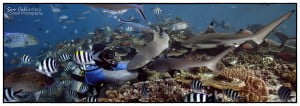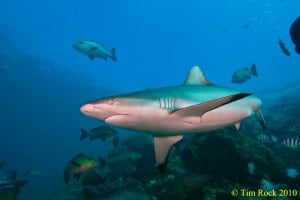It is estimated that globally as many as 73 million sharks are killed every year, and that shark populations have dropped by 70- 80% over the past few years. This is due to commercial fishing for sharks, most of which are thrown away once their fins have been sliced off for sale for shark fin soup.
However it is very hard to collect data on sharks – because sharks normally spread out along the reefs in deep offshore waters, only a few are seen at any time, and normal fish counting techniques which count numbers of fish in a measured area cannot pick up enough sharks to make realistic assessments of populations.
 This is where “Citizen Science“ comes into its own; by having many eyes on many reefs, we can collect data from hundreds of observers all across Fiji, and create the first real picture of which sharks live where, and get an idea of real shark numbers.
This is where “Citizen Science“ comes into its own; by having many eyes on many reefs, we can collect data from hundreds of observers all across Fiji, and create the first real picture of which sharks live where, and get an idea of real shark numbers.
Getting real data on shark populations is vital for proper management, and The Great Fiji Shark Count is a very important part of getting this data, both for work in Fiji and also to supply information to global surveys.
Future shark counts will be used to record the success of shark protection measures.
Inshore Sharks
Offshore Sharks















